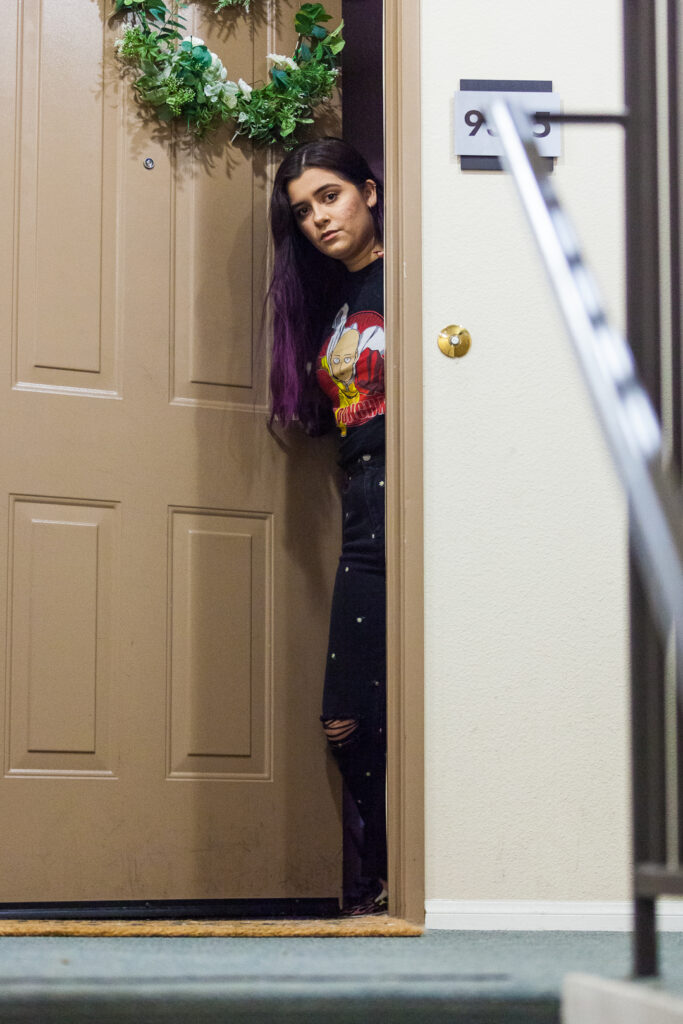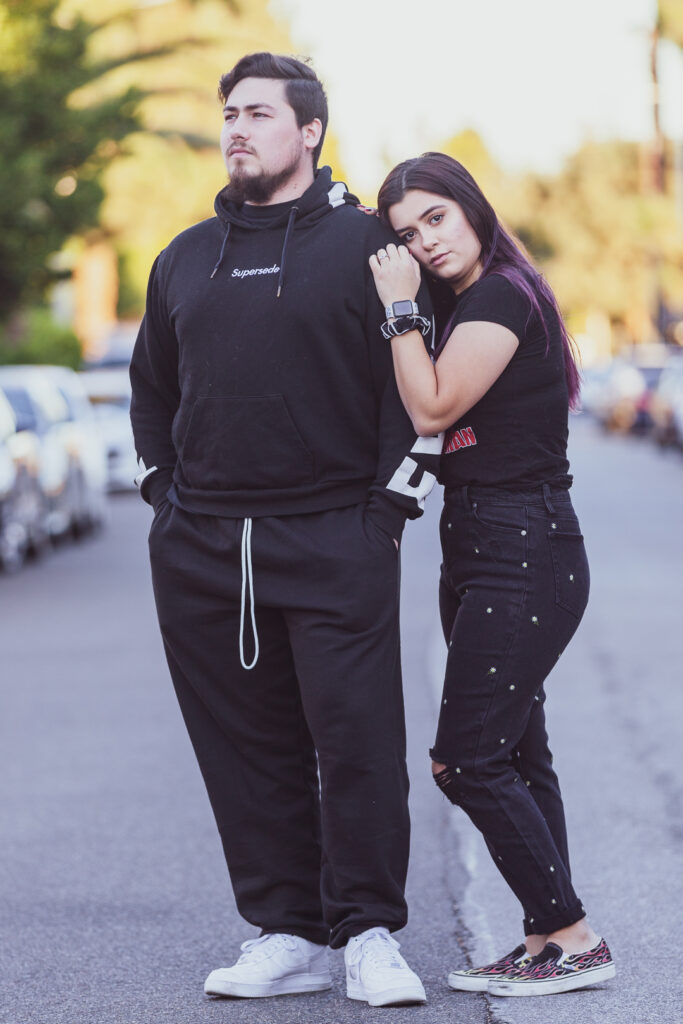
Jazlyn De La Cruz stands by her front door in Placentia, Calif., on Nov. 15, 2020. Photo by Benjamin Hanson. 
Sean Raus and Jazlyn De La Cruz stand in the street by their apartment in Placentia, Calif., on Nov. 15, 2020. Photo by Benjamin Hanson.
Waking up to a new reality, Jazlyn De La Cruz ponders her daily routine. Quiet, sad and feeling lonely, she watches her boyfriend leave for work.
She lies in bed with only her thoughts and her cellphone to keep her company. She doesn’t feel like leaving her bed.
Only getting up to grab a bite to eat, she goes back into her cave. She tries to find anything to give herself some type of normalcy.
De La Cruz is not the only person who is in this rut. Isolation during the pandemic has negatively affected the mental health of many, who have found that the lack of social interaction has made them more depressed.
Loneliness, depression and anxiety have increased about 60% among people aged 18 to 35, according to United Press International.
“From the low interaction with family to having to keep track of my schoolwork, I feel as though I am losing my mind,” De La Cruz said. “If I did not live with my boyfriend, my mental health would have been even worse. He reminds me that I am only human and that everyone is going through different struggles even if they do not show it.”
She has found it challenging to be unable to visit her grandparents, who are higher at risk for Coronavirus.
“It is especially hard to try not to see my grandpa because he had just had a stroke and lives all the way in Utah,” De La Cruz said. “I have not seen him or my grandma since March. They miss me and I miss them, but I know as soon as I see them, I’d want to wrap them in my arms.”
The worry of passing on the virus and protecting herself and others has heightened De La Cruz’s anxiety.
“I would say the pandemic has made me feel anxious, but I wouldn’t go as far as to say that I am depressed,” De La Cruz said. “It makes me anxious when I go out because I work with the public. I constantly think that my boss will judge me if they hear I went to a get together because I see so many people every day that if I am asymptomatic, I could be passing along the virus to customers or the people I am hanging out with.”
A student at California State University Fullerton, De La Cruz has struggled with the transition to virtual learning.
“I have never been the best at online classes,” De La Cruz said. “There are so many distractions and resources, I feel as though I do not need to learn the material.”
As a psychology student, De La Cruz has learned that people love the approval of others and do not thrive being alone, so she makes herself available to those around her.
“I let it be known that I am a shoulder to cry on and an ear that will listen,” De La Cruz said. “No one is ever truly alone in this world, and letting people in helps not only myself, but the people who I talk to as well.”
Virtual communication has allowed De La Cruz to connect with others more often than before the quarantine.
“I now make an effort to check up on people or speak my opinion, especially when it is a positive one,” De La Cruz said. “I have always had challenges having close friendships. I have many friends, but not the type of friends that I can call to hang out with me.”
Many people have turned to therapy to cope with their emotions and mental health struggles. Therapist Lily Suzuki, whose therapy sessions are now mostly virtual, has witnessed how the pandemic has affected her patients.
“I have been seeing about the same amount of patients since the pandemic, but there are more referrals than I can handle,” Suzuki said. “Patients have more depression and anxiety in general. Relationship issues are more intense. There is more isolation, weight gain, problems sleeping and fears about the future. Certainly those are affected by job loss. There is a little more substance abuse going on.”
Virtual sessions have been tough for Suzuki and the change has affected her health.
“I do have more headaches and fatigue when I do video therapy, and it’s more challenging looking at a screen than enjoying an office together and seeing body language cues,” Suzuki said.
Sierra Ramirez, a student at University of California, San Diego, is struggling to cope with her mental health during the pandemic.
“I seem to feel very disconnected to the reality of the world, almost like a coping mechanism,” Ramirez said. “This pandemic has been overwhelming and the unknown outcome has increased my anxiety which has led me to be more depressed.”
Ramirez enjoys being around people but has had to limit her social activities.
“Social distancing has definitely been a challenge for myself,” Ramirez said. “I tend to be a talkative person so not having those social interactions leave me feeling hopeless at times. Personally, I would consider myself to be both an introvert and extrovert so social distancing has been overwhelming at times when I need those social interactions.”
The pandemic has placed a heavy burden on Ramirez’s mental health and has made her feel more depressed and anxious.
“A lot of times I think of the worst situation: I’ll get COVID and be very sick or all of my family will get it and get very sick,” Ramirez said.
Ramirez has also been struggling to keep up with her classes, and Zoom classes have become more of a chore than enjoyment.
“Virtual learning has not helped with my mental health as well,” Ramirez said. “I would prefer to be in person classes. I feel as if I’m not getting my full college experience.”
To improve her mental state, Ramirez has turned to keeping up with friends and cooking for her parents on her days off.
She said she can’t go without having social interactions and having these activities have helped her.
“Distracting my mind and focusing on myself are my coping mechanisms,” Ramirez said.
One organization helping people cope with their mental health issues is the National Alliance on Mental Illness (NAMI), which has thousands of locations throughout the country.
The organization’s mission is to provide knowledge and assistance to the community, according to Kim Burnell, president of NAMI’s San Fernando Valley division.
They are made up of all volunteers who are struggling or have struggled with mental illnesses, and they provide free education classes for their clients’ family and friends through their outreach program.
“Classes focus on communication skills, coping and managing techniques,” Burnell said. “We also offer a HelpLine for the community to call to gain resources, and we direct people to the proper treatment areas.”
Burnell said although it is harder to provide services online, the organization has seen an increase with the community reaching out for help.
“The pandemic has made it challenging, as people are more isolated,” Burnell said. “Everything is virtual help now. Our HelpLine has risen in numbers since the pandemic began.”
NAMI seeks to help people with mental illnesses live healthy lives and get the support they need.
“We offer hope and save lives,” Burnell said. “People think their life is over.”
While holding onto hope can be challenging during the pandemic, some have learned that it can be found from within.
De La Cruz said people should do things that make them happy.
“Even if you are feeling down, it is temporary,” De La Cruz said. “No one is able to control your emotions other than yourself. You are a unique individual that was put onto this Earth for a reason.”
For sidebar information and background to this story, listen to Elizabeth Dowell’s audio interviews.
To learn more about this story, listen to the KPCRadio.com audio package by staff member Kean Pineda.



